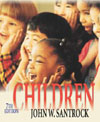John W. Santrock,
University of Texas, Dallas
| androgens | the main class of male sex hormones.
(See 318, 473)
|
 |
 |
 |
| authoritarian parenting | a restrictive punitive style in which parents exhort the child to follow their directions and to respect work and effort. The authoritarian parent places firm limits and controls on the child and allows little verbal exchange. Authoritarian parenting is associated with children's social incompetence.
(See 326)
|
 |
 |
 |
| authoritative parenting | a parenting style in which parents encourage their children to be independent but still place limits and controls on their actions. Extensive verbal give-and-take is allowed, and parents are warm and nurturant toward the child. Authoritative parenting is associated with children's social competence.
(See 326)
|
 |
 |
 |
| autonomous morality | the second stage of moral development in Piaget's theory, displayed by older children (about 10 years of age and older). The child becomes aware that rules and laws are created by people and that, in judging an action, one should consider the actor's intentions as well as the consequences.
(See 315)
|
 |
 |
 |
| cognitive developmental theory of gender | the theory that children's gender typing occurs after they have developed a concept of gender. Once they consistently conceive of themselves as male or female, children often organize their world on the basis of gender.
(See 322)
|
 |
 |
 |
| constructive play | play that combines sensorimotor/practice repetitive activity with symbolic representation of ideas. Constructive play occurs when children engage in selfregulated creation or construction of a product or a problem solution.
(See 345)
|
 |
 |
 |
| empathy | reacting to another's feelings with an emotional response that is similar to the other's feelings.
(See 317)
|
 |
 |
 |
| estrogens | the main class of female sex hormones.
(See 318, 473)
|
 |
 |
 |
| games | activities engaged in for pleasure that include rules and often competition with one or more individuals.
(See 345)
|
 |
 |
 |
| gender | The social and psychological dimension of being female or male.
|
 |
 |
 |
| gender identity | the sense of being male or female, which most children acquire by the time they are 3 years old.
(See 318)
|
 |
 |
 |
| gender role | a set of expectations that prescribes how females or males should think, act, and feel.
(See 318)
|
 |
 |
 |
| gender schema theory | the theory that an individual's attention and behavior are guided by an internal motivation to conform to gender-based sociocultural standards and stereotypes.
(See 322)
|
 |
 |
 |
| heteronomous morality | the first stage of moral development, in Piaget's theory, occurring from approximately 4 to 7 years of age. Justice and rules are conceived of as unchangeable properties of the world, removed from the control of people.
(See 315)
|
 |
 |
 |
| imminent justice | the concept that, if a rule is broken, punishment will be meted out immediately.
(See 316)
|
 |
 |
 |
| indulgent parenting | a style of parenting in which parents are highly involved with their children but place few demands or controls on them. Indulgent parenting is associated with children's social incompetence, especially a lack of self-control.
(See 327)
|
 |
 |
 |
| moral development | development regarding rules and conventions about what people should do in their interactions with other people.
(See 315)
|
 |
 |
 |
| neglectful parenting | a style of parenting in which the parent is very uninvolved in the child's life; it is associated with children's social incompetence, especially a lack of self-control.
(See 327)
|
 |
 |
 |
| peers | children of about the same age or maturity level.
(See 339)
|
 |
 |
 |
| play | a pleasurable activity that is engaged in for its own sake.
(See 341)
|
 |
 |
 |
| play therapy | therapy that allows the child to work off frustrations and is a medium through which the therapist can analyze the child's conflicts and ways of coping with them. Children may feel less threatened and be more likely to express their true feelings in the context of play.
(See 341)
|
 |
 |
 |
| practice play | play that involves repetition of behavior when new skills are being learned or when physical or mental mastery and coordination of skills are required for games or sports. Sensorimotor play, which often involves practice play, is primarily confined to infancy, while practice play can be engaged in throughout life.
(See 343)
|
 |
 |
 |
| pretense/symbolic play | play in which the child transforms the physical environment into a symbol.
(See 344)
|
 |
 |
 |
| psychoanalytic theory of gender | a theory deriving from Freud's view that the preschool child develops a sexual attraction to the opposite-sex parent, by approximately 5 or 6 years of age renounces this attraction because of anxious feelings, and subsequently identifies with the same-sex parent, unconsciously adopting the same-sex parent's characteristics.
(See 320)
|
 |
 |
 |
| self-understanding | the child's cognitive representation of self, the substance and content of the child's self-conceptions.
(See 311)
|
 |
 |
 |
| sensorimotor play | behavior engaged in by infants to derive pleasure from exercising their existing sensorimotor schemas.
(See 343)
|
 |
 |
 |
| social cognitive theory of gender | a theory that emphasizes that children's gender development occurs through the observation and imitation of gender behavior and through the rewards and punishments children experience for gender-appropriate and inappropriate behavior.
(See 320)
|
 |
 |
 |
| social play | play that involves social interactions with peers.
(See 345)
|



 2003 McGraw-Hill Higher Education
2003 McGraw-Hill Higher Education